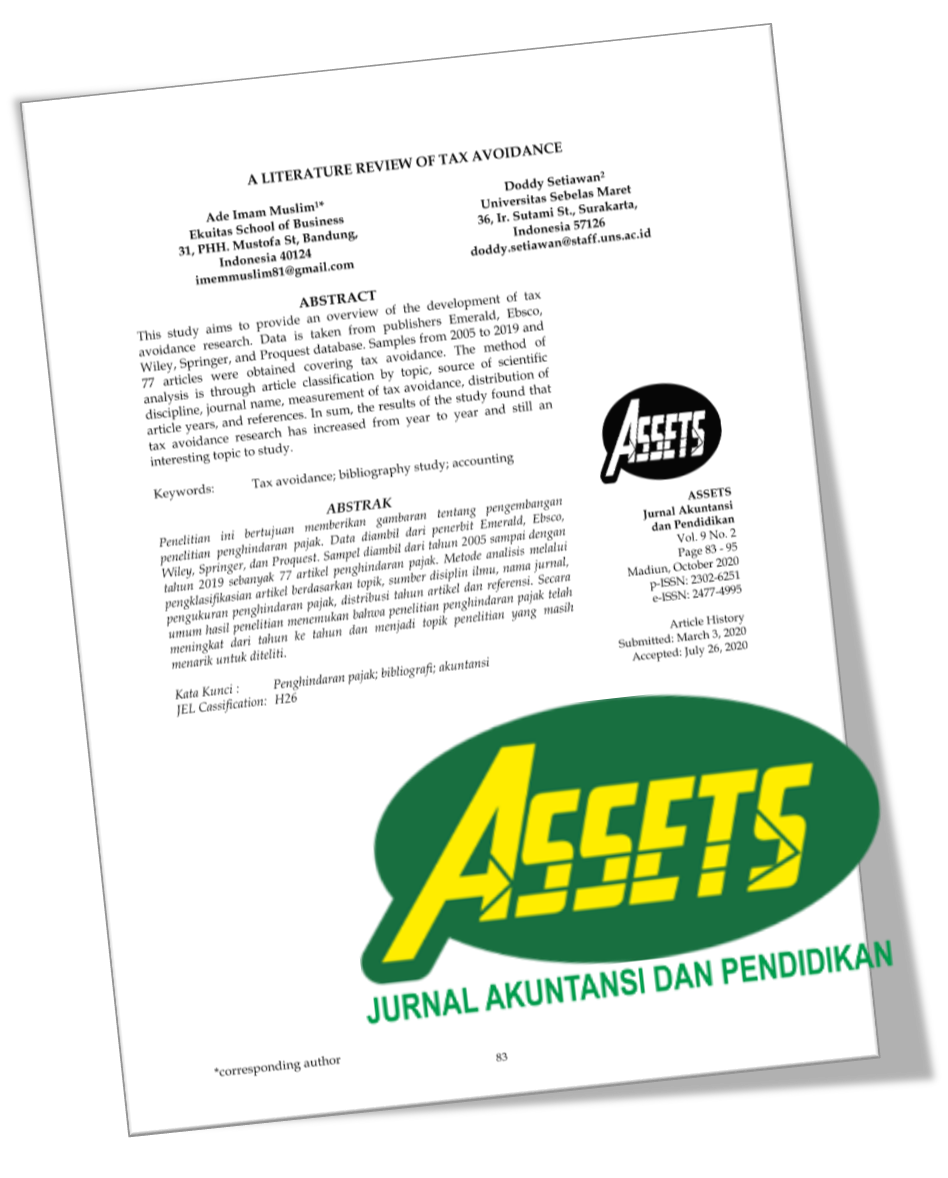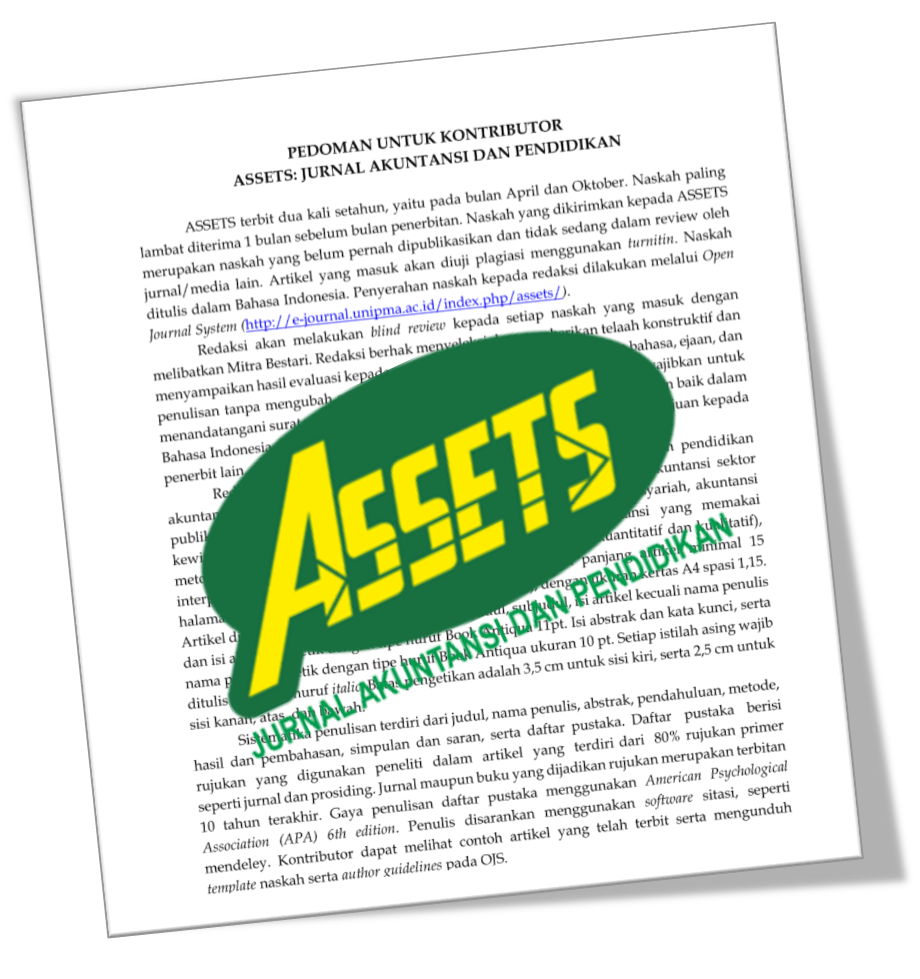Adopsi IFRS, Manajemen Laba Akrual dan Manajemen Laba Riil
DOI:
https://doi.org/10.25273/jap.v7i2.3310Keywords:
Kualitas laporan keuangan, perubahan standar akuntansiAbstract
Penelitian ini bertujuan untuk menguji dampak adopsi IFRS terhadap manajemen laba akrual dan manajemen laba riil. Pengujian model dilakukan menggunakan regresi berganda dengan data panel. Hasil pengujian menunjukkan bahwa adopsi IFRS berpengaruh positif terhadap manajemen laba akrual. Walaupun IFRS memberikan aturan yang lebih ketat, namun IFRS yang menerapkan pendekatan prinsip tidak mengubah perilaku manajer untuk tetap melakukan manajemen laba dengan memilih salah satu metode penerapan akuntansi tertentu yang paling menguntungkan. Selanjutnya, adopsi IFRS tidak berpengaruh terhadap manajemen laba riil. Hal ini menunjukkan bahwa tidak ada pergeseran perilaku manajer dari manajemen laba akrual menjadi manajemen laba riil setelah adopsi IFRS.
Downloads
References
Ahmed, A.S., Neel, M., and Wang, D. (2013). Does mandatory adoption of IFRS improve accounting quality? Preliminary evidence. Contemporary Accounting Research, 30(4): 1344-1372.
Asni, F., and Mayasari, M. (2018). Perbedaan sebelum dan sesudah adopsi IFRS terhadap manajemen laba arkual dan manajemen laba riil pada perusahaan manufaktur yang terdaftar di BEI. Journal of Applied Managerial Accounting, 2(1): 82-87.
Ball, R. (2006). International financial reporting standards (IFRS): pros and cons for investors. Accounting and Business Research, 36(Special Issue); 5-27.
Barth, M.E., Landsman, W.R. and Lang, M.H. (2008). International accounting standards and accounting quality. Journal of Accounting Research, 46(3): 467-498.
Brochet, F., Jagolinzer, A., and Riedl, E. (2013). Mandatory IFRS adoption and financial statement comparability. Contemporary Accounting Research, 30(4): 1373-1400.
Chen, H., Tang, Q., Jiang, Y., and Lin, Z. (2010). The role of international financial reporting standards in accounting quality: evidence from the European Union. Journal of International Financial Management and Accounting, 21(3): 220-278.
Cohen, D.A, Dey, A., and Lys, T.Z. (2008). Real and accrual-based earnings management in the pre- and post-Sarbanes-Oxley periods. The Accounting Review, 83(3): 757-78.
Doukakis, L. (2014). The effect of mandatory IFRS adoption on real and accrual-based earnings management activities. Journal of Accounting and Public Policy, 33(6): 551-572.
Ewert, R., and Wagenhofer, A. (2005). Economic effects of tightening accounting standards to restrict earnings management. The Accounting Review, 80(4): 101-1124.
Ferentinou, A.C., and Anagnostopoulou, S.C. (2014). Accrual-Based And Real Eranings Management Before And After IFRS Adoption; The Case Of Greece, Journal of Applied Accounting Research, 17 (1): 2-23
Firmansyah, A. (2017). Pengaruh Income Smoothing dan Real Earnings Management Terhadap Keinformatifan Laba. Jurnal Online Insan Akuntan, 2(2): 175-188.
Ipino, E,. and Parbonetti, A. (2011). Mandatory IFRS adoption: the trade-off between accrual and real-based earnings management. Working paper, SSRN.
Irmawati, and Dina, F. (2016). Dampak konvergensi IFRS dan independensi auditor terhadap manajemen laba dan relevansi nilai informasi akuntansi. ASSETS, 6(2): 210-220.
Jaya, I.M.L.M. (2017). Pengaruh konvergensi IFRS terhadap manajemen laba dengan kepemilikan institusional sebagai variabel moderasi. Jurnal EBBANK, 8(2): 61-74
Jensen, M. C., and Meckling, W. H. (1976). Theory of the firm: managerial behavior, agency costs and ownership structure. Journal Of Financial Economics, 3(4), 305–360.
Karampinis, N. I., and Hevas, D. L. (2013). Effects of IFRS Adoption on Tax-induced Incentives for Financial Earnings Management: Evidence from Greece. The International Journal of Accounting, 48(2), 218–247
Kothari, S.P., Leone, A.J., and Wasley, C.E. (2005). Performance-matched discretionary accrual measures. Journal of Accounting and Economics, 39(1): 163-197.
Lambertides, N. and Mazouz, K. (2013). Stock price volatility and informational efficiency following the mandatory adoption of IFRS in Europe. Journal of Applied Accounting Research, 14(1): 4-17.
Roychowdhury, S. (2006). Earnings management through real activities manipulation. Journal of Accounting and Economics, 42(3): 335-370.
Schipper, K. (1989). Commentary: earnings management. Accounting Horizons, 3(4):91-102.
Scott, W.R. (2015). Financial Accounting Theory. 7th Ed. Toronto: Pearson Prentice Hall.
Sellami, M, and Fakhfakh, H. (2014). Effect of the mandatory adoption of IFRS on real and accruals based earnings management: Empirical evidence from France. International Journal of Accounting and Economics Studies, 2 (1): 22-33.
Supratin, S., and Tresnaningsih, E. (2013). Dampak konvergensi international financial standards terhadap nilai relevan informasi akuntansi. Jurnal Akuntansi dan Keuangan Indonesia, 10(2): 171-183.
Van Tendeloo, B., and Vanstraelen, A. (2005). Earnings management under German GAAP versus IFRS. European Accounting Review, 14(1), 155-180.
Watts, R.L, and Zimmerman, J.L. (1986). Positive Accounting Theory. New Jersey, USA: Prentice Hall.
Wijanarko, D., and Tjahjono, A. (2016). Pengaruh adopsi IFRS terhadap manajemen laba pada perusahaan manufaktur yang terdaftar di BEI tahun 2010-2014. Jurnal Riset Manajemen, 3(2): 190-211.
Windarti, E., Sasongko, N., and Zulfikar (2017). Analisis perbedaan kualitas accrual antara sebelum dan sesuah pengadopsian international financial reporting standard (IFRS) pada perusahaan manufaktur di Indonesia. Riset Akuntansi dan Keuangan Indonesia, 2(1): 42-47.
Zang, A.Y. (2012). Evidence on the trade-off between real activities manipulation and accrual-based earnings. The Accounting Review, 87(2): 675-704.
Zeff, S. (2007). Some obstacles to global financial reporting comparability and convergence at a high level of quality. British Accounting Review, 39 (4): 290-302.
Zeghal, D., Chtourou, S.M., and Fourati, Y.M. (2012). The effect of mandatory adoption of IFRS on earnings quality: evidence from the European Union. Journal of International Accounting Research, 11(2): 1-25.
Zuhari, M.S., and Nurdiniah, D., (2018). Dampak konvergnsi IFRS dan leverage terhadap manajemen laba dengan pertumbuhan penjualan sebagai variabel moderasi. Jurnal Riset Manajemen dan Bisnis 3(1): 111-120.
Downloads
Published
Issue
Section
License
Perjanjian Lisensi dan Hak Cipta
Saat mengirimkan naskah ke jurnal, penulis menyatakan bahwa:
- Mereka diberi wewenang oleh rekan penulisnya untuk masuk ke dalam perjanjian ini.
- Karya yang dimaksud belum pernah diterbitkan secara resmi sebelumnya, kecuali dalam bentuk abstrak atau sebagai bagian dari kuliah, resensi, tesis, atau overlay jurnal yang diterbitkan.
- Karya yang dimaksud tidak sedang dipertimbangkan untuk diterbitkan di tempat lain,
- Publikasi karya yang dimaksud telah disetujui oleh semua penulis dan oleh otoritas yang bertanggung jawab - secara tahu sama tahu atau eksplisit - dari lembaga tempat pekerjaan itu dilakukan.
- Mereka mengamankan hak untuk mereproduksi materi apa pun yang telah diterbitkan atau dilindungi hak cipta di tempat lain.
- Mereka menyetujui lisensi dan perjanjian hak cipta berikut.
Hak Cipta
Penulis yang menerbitkan dengan ASSETS: Jurnal Akuntansi dan Pendidikan menyetujui persyaratan berikut:
- Penulis mempertahankan hak cipta dan memberikan jurnal hak publikasi pertama dengan karya yang secara bersamaan dilisensikan di bawah Lisensi Atribusi Creative Commons (CC BY-SA 4.0) yang memungkinkan orang lain untuk berbagi karya dengan pengakuan kepenulisan karya dan publikasi awal di jurnal ini.
- Penulis dapat masuk ke dalam pengaturan kontrak tambahan yang terpisah untuk distribusi non-eksklusif dari versi jurnal yang diterbitkan dari karya tersebut (misalnya, mempostingnya ke repositori institusional atau menerbitkannya dalam sebuah buku), dengan pengakuan publikasi awalnya di jurnal ini.
- Penulis diizinkan dan didorong untuk memposting karya mereka secara daring (misalnya di repositori institusional atau di situs web mereka) sebelum dan selama proses pengiriman, karena dapat menghasilkan pertukaran yang produktif, serta kutipan lebih awal dan lebih besar dari karya yang diterbitkan.
License and Copyright Agreement
In submitting the manuscript to the journal, the authors certify that:
- Their co-authors authorize them to enter into these arrangements.
- The work described has not been formally published before, except as an abstract or part of a published lecture, review, thesis, or overlay journal.
- That it is not under consideration for publication elsewhere,
- That its publication has been approved by all the author(s) and by the responsible authorities – tacitly or explicitly – of the institutes where the work has been carried out.
- They secure the right to reproduce any material already published or copyrighted elsewhere.
- They agree to the following license and copyright agreement.
Copyright
Authors who publish with ASSETS: Jurnal Akuntansi dan Pendidikan agree to the following terms:
- Authors retain copyright and grant the journal right of first publication with the work simultaneously licensed under a Creative Commons Attribution License (CC BY-SA 4.0) that allows others to share the work with an acknowledgment of the work's authorship and initial publication in this journal.
- Authors can enter into separate, additional contractual arrangements for the non-exclusive distribution of the journal's published version of the work (e.g., post it to an institutional repository or publish it in a book), with an acknowledgment of its initial publication in this journal.
- Authors are permitted and encouraged to post their work online (e.g., in institutional repositories or on their website) before and during submission, as it can lead to productive exchanges and earlier and more extraordinary citations of published work.

ASSETS: Jurnal Akuntansi dan Pendidikan is licensed under a Creative Commons Attribution-ShareAlike 4.0 International License.










